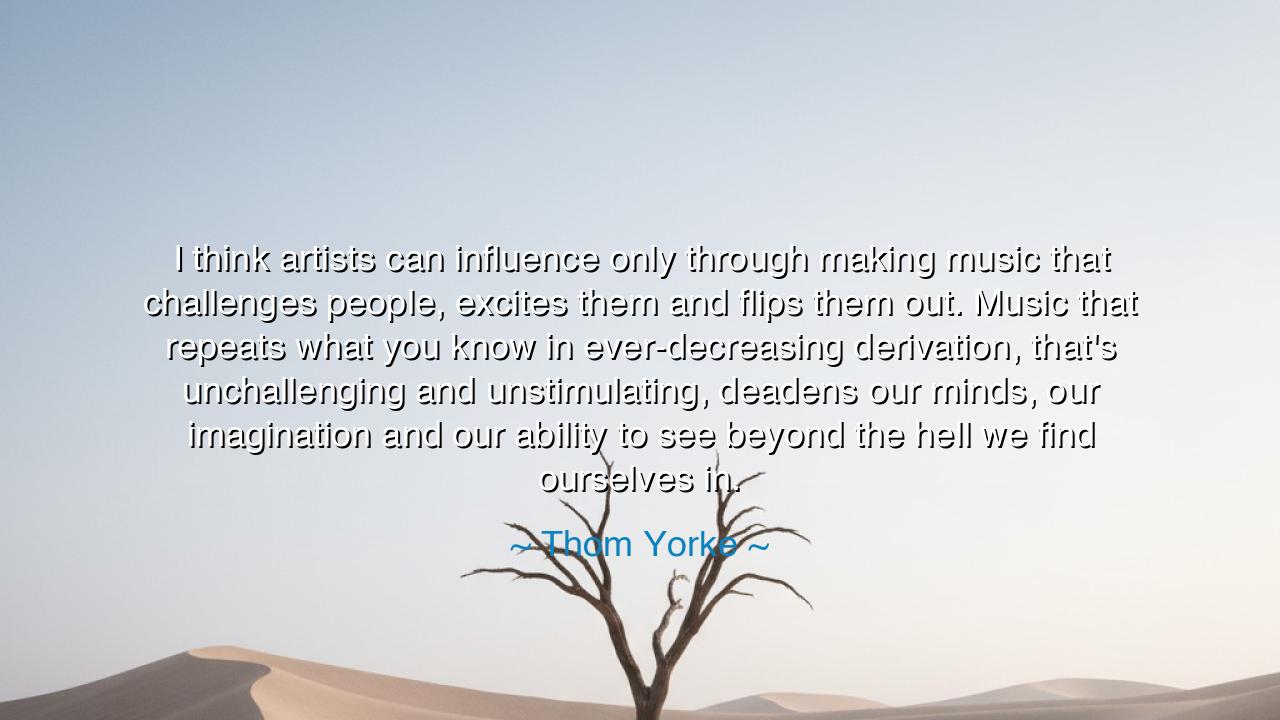
I think artists can influence only through making music that
I think artists can influence only through making music that challenges people, excites them and flips them out. Music that repeats what you know in ever-decreasing derivation, that's unchallenging and unstimulating, deadens our minds, our imagination and our ability to see beyond the hell we find ourselves in.






“I think artists can influence only through making music that challenges people, excites them and flips them out. Music that repeats what you know in ever-decreasing derivation, that's unchallenging and unstimulating, deadens our minds, our imagination and our ability to see beyond the hell we find ourselves in.” Thus spoke Thom Yorke, the voice of disquiet and the prophet of modern alienation. His words ring with fire and rebellion, yet beneath them lies a deep longing for renewal — the call for art that awakens, for music that disrupts, for creation that restores the soul’s power to see beyond the hell of numb existence. In these lines, Yorke speaks not merely of sound, but of the sacred duty of the artist — to shake the slumbering heart and to remind the world that it yet lives.
In the ancient world, the artist was seen as a vessel of divine madness — a chosen one through whom the gods spoke. To create was not to decorate life but to transform it. Yorke stands in that same lineage. His cry is against stagnation, against repetition that dulls the spirit. When he speaks of music that “repeats what you know,” he condemns not only formulaic art, but the habit of comfort that enslaves human minds. For when we consume only what feels familiar, we become prisoners of our own certainty. Art must disturb, not soothe. It must be the thunder that breaks the walls of complacency.
Let us recall Beethoven, who, though deaf and tormented, refused to write music that pleased the polite ears of his time. His late symphonies were storms — wild, defiant, incomprehensible to many — yet they remade the landscape of sound forever. Listeners who expected elegance found instead revelation, the raw power of a soul wrestling with eternity. Beethoven, like Yorke, knew that art’s purpose is not to flatter but to elevate, not to repeat the known but to open new dimensions of being. Through such art, the mind is reawakened, and what once seemed hell becomes bearable through vision.
And what of our age, where music flows endlessly yet so much of it is hollow? Yorke’s words strike at this wound — the deadening that comes when art becomes commerce, when songs become product, when creation becomes imitation. The artist, he warns, must resist the siren of sameness. For the soul of a people withers when their art no longer challenges or excites. Without imagination, humanity forgets its power to dream, and the fire that once lit civilizations turns to ash. Thus, Yorke’s lament is not bitterness, but a call to arms — for artists to once more be prophets and revolutionaries.
But this truth belongs not to artists alone. Every human being is a creator — of thought, of word, of world. When Yorke speaks of imagination, he speaks to all. If we allow ourselves to be lulled by repetition — by routine, by screens, by hollow pleasures — our inner world shrinks. The ability to see beyond fades, and life becomes a dim corridor where nothing surprises us anymore. Yet, if we seek what is difficult, strange, and alive — if we challenge ourselves to feel again — we rediscover our humanity.
Let each of us, then, become an artist of our own existence. Seek what challenges, what awakens, what burns. Read words that unsettle you. Listen to songs that move you to tears or fury. Speak truths that frighten you. Create, not for applause, but for revelation. For every act of imagination — every moment you refuse to live on repeat — you strike a blow against the slow death of the soul. You keep the divine spark alive.
So remember, traveler of this age: comfort is the enemy of creation. The music of life must not be a lullaby, but a symphony of courage and renewal. As Thom Yorke teaches, only art that shakes us free from our illusions can show us beyond the hell we find ourselves in. And if we dare to listen — truly listen — we may yet find that even in chaos, the song of truth still plays, fierce and beautiful, waiting for those who have the imagination to hear it.






AAdministratorAdministrator
Welcome, honored guests. Please leave a comment, we will respond soon